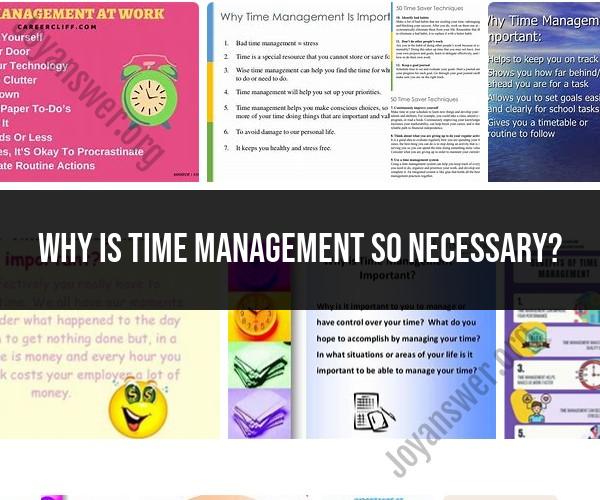Why is time management so necessary?
Time management is crucial for several reasons, and its significance extends to both personal and professional aspects of life. Here are some compelling reasons why time management is absolutely necessary:
Increased Productivity: Effective time management allows individuals to accomplish more tasks and goals in less time. By prioritizing and organizing tasks, you can make the most of your available time and achieve better results.
Less Stress: Poor time management often leads to stress, anxiety, and a sense of being overwhelmed. Properly managing your time helps reduce stress levels by allowing you to approach tasks in a calm and organized manner.
Improved Decision-Making: Time management helps you allocate resources wisely, make informed decisions, and choose the best course of action. When you have more time to evaluate options, you're less likely to make rushed or impulsive decisions.
Better Work-Life Balance: Effective time management enables individuals to allocate time for work, personal life, and leisure activities. This balance enhances overall well-being and prevents burnout.
Enhanced Focus and Concentration: When you allocate specific time blocks for tasks and minimize distractions, you can concentrate better on the task at hand, leading to higher quality work.
Meeting Deadlines: Time management ensures that you meet deadlines consistently. Meeting deadlines is essential in both personal and professional settings, as it fosters trust and reliability.
Achievement of Goals: Whether it's personal or professional goals, time management helps you break down larger objectives into manageable tasks. This step-by-step approach makes it more likely that you'll achieve your goals.
Improved Efficiency: Time management encourages efficiency by eliminating time-wasting activities, multitasking, and improving time utilization.
Better Time Utilization: Time is a finite resource, and effective time management helps you use it wisely. You can allocate more time to meaningful activities and less time to unproductive ones.
Increased Opportunities: When you manage your time well, you create opportunities for personal and professional growth. You have the time and energy to learn new skills, pursue interests, and take on challenging projects.
Personal Development: Time management fosters discipline, self-control, and self-awareness, which are essential qualities for personal development and growth.
Enhanced Relationships: Proper time management allows individuals to spend quality time with family, friends, and loved ones. Strong relationships are built on shared experiences and meaningful interactions.
Competitive Advantage: In the workplace, effective time management can give you a competitive edge by enabling you to complete tasks efficiently and stand out as a reliable and organized professional.
Financial Benefits: Managing time wisely can lead to financial benefits, such as increased productivity at work, potential for career advancement, and the ability to pursue entrepreneurial opportunities.
Long-Term Success: Time management is a skill that contributes to long-term success and sustainability in both personal and professional life. It helps you adapt to changing circumstances and make the most of your resources.
In summary, time management is necessary because it empowers individuals to make the most of their time, reduce stress, achieve goals, and maintain a healthy work-life balance. It is a fundamental skill that contributes to success, personal growth, and overall well-being.













